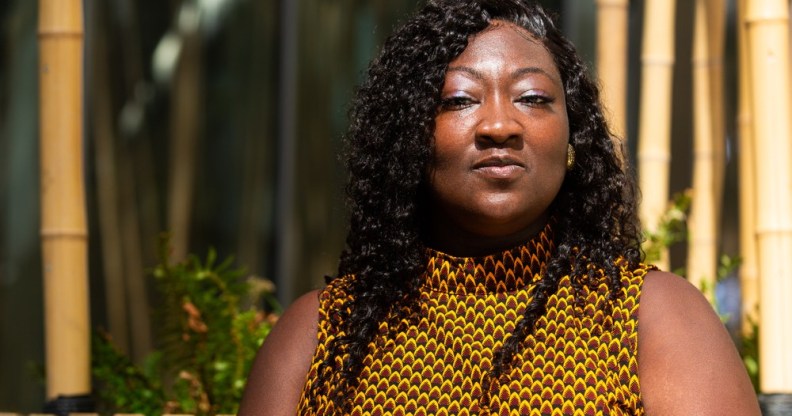Lady Phyll explains why it’s vital schools teach Britain’s ugly history of colonialism and slavery

Lady Phyll, co-founder of UK Black Pride and executive director of Kaleidoscope Trust (Corinne Cumming)
Lady Phyll says schools need to not shy away from conversations about race, class, and sexuality.
The co-founder of UK Black Pride said she was seen as a “trouble maker” at school because she dared question why history lessons dodged Britain’s legacy of colonialism and slavery.
Speaking on Just Like Us’ new podcast series, Growing up LGBT+ to mark Black History Month, Phyll Akua Opoku-Gyimah, more commonly known as Lady Phyll, highlighted the importance of giving school children the language to talk about intersectionality, discrimination, and oppression.
“It’s so important that the next generation feel that they are able to have some of these very nuanced conversations. And help educate us,” she said.
Lady Phyll explained that the curriculum at the predominantly white school she attended covered all of the usual academic bases.
“I love history and I was taught about Christopher Colombus, the Battle of Hastings 1066, I can recite the names of Henry VIII’s wives,” she said.
However, she continued: “I was never taught about colonialism and enslavement and slavery and capitalism and how Britain benefitted off the backs of Black people through enslavement. I would always question and I would be sent out of the classroom for disrupting.”
Lady Phyll hasn’t changed since school
Rather than letting this resistance dampen her spirits, Lady Phyll has continued to hold her own and challenge what needs to be challenged
“I’ve been sent out of the boardroom for being disruptive,” she continued. “I am what some people see as the angry Black woman – those tropes and stereotypes that exist – because I question, so things have changed since school but some things have stayed the same.
“I’m glad my conviction and passion have stayed the same to continue to challenge and question when something doesn’t feel right for our communities or people.”
Lady Phyll believes that schools needs to be more inclusive and intersectional, recognising how race, sex, sexuality, and class can impact students and teachers alike.
When asked about her early experiences of LGBT+ education she said: “When you don’t have those conversations about sexuality or sexual orientation you can’t unpack it.”
Just because Lady Phyll didn’t get her LGBT+ education in the classroom, that doesn’t mean she didn’t do her homework.
“When I came out well over 20 years ago, I was thinking I’m the only Black lesbian in the village – we all think we’re the only ones – but then you do your homework and your research.
“You realise that there are people that came before you. This is why I always talk about the shoulders of giants that I stand on because they’re the ones that actually paved the way – people like Veronica McKenzie, Femi Otitoju who was the first Black lesbian woman to head up and work on the London Lesbian and Gay Switchboard. You had Monica Beadle, who is Rikki Beadle-Blair’s mother.
“There were so many but when the media presents what representation looks like and it doesn’t look like us, you don’t see these people who have been doing the groundwork for many, many years. You only see what is an ideal standard of beauty or acceptance in media.”
These role models helped shape Lady Phyll into the powerful force that she is today
“Positive representation really does matter. There’s a quote from Dr Ronx, they say: ‘You cannot be what you cannot see.’ When you don’t see people that reflect some of your own struggles, your histories, your identities, then you’re going to feel somewhat isolated or alone or that you’re having to do this journey of life on your own.”

